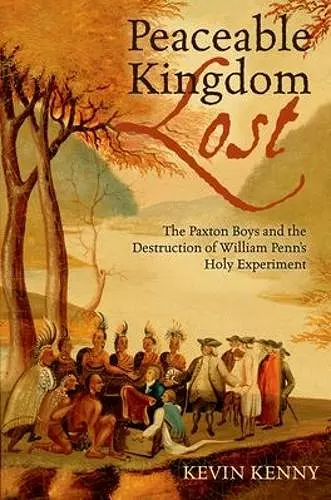Peaceable Kingdom Lost
The Paxton boys and the Destruction of William Penn's Holy Experiment
Format:Hardback
Publisher:Oxford University Press Inc
Published:30th Jul '09
Currently unavailable, and unfortunately no date known when it will be back
This hardback is available in another edition too:
- Paperback£33.99(9780199753949)

William Penn established Pennsylvania in 1682 as a "holy experiment" in which Europeans and Indians could live together in harmony. In this book, historian Kevin Kenny explains how this Peaceable Kingdom--benevolent, Quaker, pacifist--gradually disintegrated in the eighteenth century, with disastrous consequences for Native Americans. Kenny recounts how rapacious frontier settlers, most of them of Ulster extraction, began to encroach on Indian land as squatters, while William Penn's sons cast off their father's Quaker heritage and turned instead to fraud, intimidation, and eventually violence during the French and Indian War. In 1763, a group of frontier settlers known as the Paxton Boys exterminated the last twenty Conestogas, descendants of Indians who had lived peacefully since the 1690s on land donated by William Penn near Lancaster. Invoking the principle of "right of conquest," the Paxton Boys claimed after the massacres that the Conestogas' land was rightfully theirs. They set out for Philadelphia, threatening to sack the city unless their grievances were met. A delegation led by Benjamin Franklin met them and what followed was a war of words, with Quakers doing battle against Anglican and Presbyterian champions of the Paxton Boys. The killers were never prosecuted and the Pennsylvania frontier descended into anarchy in the late 1760s, with Indians the principal victims. The new order heralded by the Conestoga massacres was consummated during the American Revolution with the destruction of the Iroquois confederacy. At the end of the Revolutionary War, the United States confiscated the lands of Britain's Indian allies, basing its claim on the principle of "right of conquest." Based on extensive research in eighteenth-century primary sources, this engaging history offers an eye-opening look at how colonists--at first, the backwoods Paxton Boys but later the U.S. government--expropriated Native American lands, ending forever the dream of colonists and Indians living together in peace.
"Worthy of serious scrutiny and reflection."--Journal of Social History "Riveting."--Irish Historical Studies "In the winter of 1763-64, colonists from the Susquehanna-side settlements of Pennsylvania committed acts of extraordinary violence against Indians living near Lancaster. This spasm of cruelty, the Paxton riots, sets in motion Kevin Kenny's Peaceable Kingdom Lost -- a patient, clearly written narrative, organized by the unraveling during wartime of a half-century of intercultural peace, that lingers especially on the murky figures of the rioters and on the Wyoming Valley of eastern Pennsylvania, a landscape contested between Natives, Pennsylvanians, and Connecticut Yankees, where intercultural animosities became intercolonial and, at last, revolutionary."--Peter Silver, author of Our Savage Neighbors: How Indian War Transformed Early America "A compelling study of the Paxton Boys' massacre of Conestoga Indians and of the volatile world that produced it. Grounding his story in the context of the French and Indian War and the escalating ethnic, social, and political tensions of eighteenth-century Pennsylvania, Kevin Kenny shows how William Penn's utopian dream of a peaceable kingdom degenerated into a nightmare of racial violence."--Colin G. Calloway, author of The Scratch of a Pen: 1763 and the Transformation of America "The massacre of the small Native American community of Conestoga by the 'Paxton Boys' has long symbolized how William Penn's vision of peaceful relations with Native peoples went horrifically wrong. Readers seeking an introduction to these tragic developments will find no surer guide than Kevin Kenny."--Daniel K. Richter, McNeil Center for Early American Studies, University of Pennsylvania "Kenny reveals how self-interest overrode the public good, with hell to pay for all concerned. In that regard, it rings true today as cause and consequence of Pennsylvania's persistent problem--how to cultivate the necessary 'common weal' to create a commonwealth....This book should remind us how much creating 'facts on the ground' can defeat ideals and turn practices into policies."--Randall M. Miller, Philadelphia Inquirer "Kenny's account of the Paxton Boys incident and its aftermath adds an interesting dimension to the scholarly literature on the relationship between European settlers and INdians and the policies that governed or directed it....By restoring a sense of contingency to the chaotic affairs of the winter of 1763 and spring of 1764, Kenny asks us to remember that human decisions shape history, and those that involve putting aside the law for short-term political gain can have disastrous consequences."---Law "Kevin Kenny has laid out a smooth and engaging narrative alongside an impressively researched analysis of the secondary historical debates surrounding the Paxton Boys. Peaceable Kingdom Lost is also the most detailed treatment of the subject to emerge in a generation, and it is an indispensable introduction to one of the most troubling and transformative episodes in the history of colonial Pennsylvania."--Pennsylvania Magazine of History and Biography "Peaceable Kingdom Lost is an important work that does much to reinterpret provincial politics and the development of racial attitudes on the Pennsylvania frontier. Most importantly, it provides detailed insight into the mentality of frontiersmen in the mid-eighteenth century."--Journal of American History "Essential reading not only for Americanists but also for those interested in the Irish diaspora."--Reviews in History "Peaceable Kingdom Lost is distinguished by Kevin Kenny's narrative skill. This well-researched book is ideal for use in history courses as a readable and engaging narrative that very ably synthesizes much of the recent scholarship on Indian-European relations in colonial and revolutionary Pennsylvania."--David L. Preston, Pennsylvania History "Kenny's fluid prose makes his a very entertaining account...Kenny masterfully weaves the perspectives of Pennsylvania's westerners, colonial leaders, and native peoples to craft a compellingly tragic narrative."--Kevin T. Barksdale, American Historical Review
ISBN: 9780195331509
Dimensions: 234mm x 157mm x 28mm
Weight: 567g
304 pages